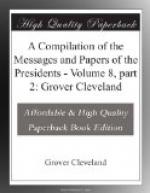W. JONES.
[From Congressional Globe, Vol. V, p. 323.]
TREASURY DEPARTMENT, February 22, 1836.
To Receivers of Public Moneys, Collectors, Disbursing Officers, and the Deposit Banks of the United States:
The established policy of the Treasury Department, so far as may be practicable under its present powers over the collection, keeping, and disbursement of the public money, is to diminish the circulation of small bank notes and to substitute specie, and especially gold, for such notes, with the view of rendering the currency of the country, through which its fiscal operations are performed, more safe, sound, and uniform. In pursuance of that policy, a circular was issued last April which prohibited after the 30th September, 1835, the receipt on account of the Government of any bank notes of a less denomination than $5, and which intimated that other steps to promote the desirable objects before named would in due time be taken.
Consequently, in further pursuance of the same policy, you are hereby required after the 1st of May next not to pay the demands of any public officer or creditor in any bank notes of a less denomination than $5, and, except when it may be otherwise prescribed by law, after the 4th of July next not to receive or pay on account of the Government any bank notes of a less denomination than $10.
All the deposit banks are requested to supply themselves with such a quantity of American gold coin as to be able to pay, and when a public officer or creditor prefers it, and his demand does not exceed $500, to pay at least one-fifth of such demand in that coin. It is also requested that the deposit banks will not after the 4th of July next issue any notes of a less denomination than $5, and that after the 3d of March, 1837, they will not, unless the subject be otherwise regulated by Congress, issue any notes of a less denomination than $10. It is believed that the amount of gold which by that time shall be coined at the Mint will be sufficient to admit of the convenient substitution of it for small notes in a much greater extent than at present; and it is deemed reasonable that while the deposit banks have the use, without interest, of unusually large sums of the public money they should make some further temporary sacrifices to obtain and circulate gold and in other respects to enlarge the specie basis of our circulating medium.
From these considerations and from the liberal spirit evinced by most of the public depositories in a late correspondence with them on this subject, it is confidently expected that in this state of things they will cheerfully comply with the above requests and with all others which have been made by the Department with a view of improving the currency; nor will it, I trust, be considered unjust or impolitic, while the deposit banks shall continue to enjoy great privileges from the Treasury, to regard a neglect or refusal by any of them to comply with those requests as sufficient cause for discontinuing the employment of such banks as fiscal agents.




